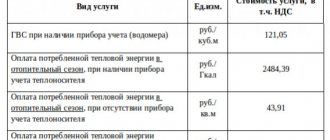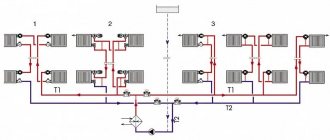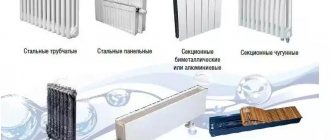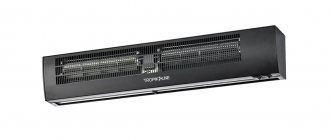Home/Heating rules/Formation of tariffs in 2022
Tariffs for thermal energy are constantly rising. Living in an apartment building with central heating, you have to pay regardless of your needs. A stunning new feature for 2022 is the introduction of summer heating charges. To understand the essence of setting heating tariffs in 2022, you should familiarize yourself with the regulatory documents. Knowing some starting points, you can draw the right conclusions and take care of saving heat
Regulations
In 2010, a law was passed that regulates all heat issues. It’s called “On Heat Supply” (07/27/2010). The main points of this document are:
- basic concepts;
- distribution of responsibilities of government bodies;
- government approach to pricing;
- relations between heat suppliers and customers;
- work on the quality of heat supply;
- price zones and their features;
- self-governing enterprises;
- rights to heat supply facilities.
Ordinary consumers are concerned only with the first six points. The structure that controls the heat supply is the Federal State Energy Supervision Authority. Antimonopoly control is assigned to the Antimonopoly Committee. The first authority in which an ordinary consumer can resolve heat-related issues of interest to him is the local authorities of administrative units.
Attention
Article 7 of the above document talks about the main approaches to setting prices and tariffs for heating in 2022. The main directions are accessibility for citizens of the state, feasibility from an economic point of view, stability. Part 6 is especially important in this article. It talks about the availability to the population of information related to heat pricing.
Many questions related to the formation of heating tariffs in 2022 are answered by Article 8. It discusses the types of payments that apply to ordinary consumers. Among them:
- tariffs for substances used for heat transfer;
- water heating fee;
- heat transportation services;
- maintaining thermal power in working condition during non-working periods.
The regulation of heat supply tariffs is based on the economic justification of costs, indexation, and ensuring profitability.
The second document relating to heat is the Federal Law of November 23, 2009 No. 261-F3 “On energy saving and increasing energy efficiency and on introducing amendments to certain legislative acts of the Russian Federation.” This law mainly concerns consumers in two chapters:
- Chapter 2 describes the powers of state authorities and local governments in the field of heat supply.
- Chapter 3 describes regulations, efficiency and heat metering.
Contents of the tariff statement
- A completed application form defining the charging method (cost justification, indexation method, etc.);
- Balance of consumption and supply of thermal energy;
- Calculation of resource costs for the production of thermal energy in accordance with established guidelines for calculating tariffs in the core area;
- Documents arguing the rationality of costs for thermal energy generation;
- Special calculations for current legislative acts (normative number, costs for workwear and footwear, examinations in medical institutions and other personnel costs);
- Calculation of rates for thermal energy.
Innovations
On July 19, 2022, a number of amendments were adopted to the law “On Heat Supply”. The main purpose of these changes is the transition from state management to negotiated prices. What exactly has changed in the legislation?
| Article | Old version | New option |
| Art.2 p10 | The program of investment projects of organizations involved in heat supply involves connecting consumers to the heat supply system. | The program of investment projects of organizations involved in heat supply involves connecting consumers to the heat supply system. This program is not being developed in price zones. |
| Art. 2p18a | It is permissible to set a price by agreement of the parties . | The price is set strictly as a result of the agreement of the parties, but cannot exceed the maximum permissible level |
| Art. 2p18b | The process of transferring thermal energy is regulated by the state | The process of transferring thermal energy is regulated by the state, but in some cases the price is acceptable by agreement of the parties |
| Article 15ch9.3 | Management organizations that receive heat for public services are required to pay fees on time, otherwise they will be charged penalties. | Management organizations that receive heat under a heat supply agreement are required to pay fees on time, otherwise they will be charged penalties. |
Who sets heating tariffs in 2022?
Article 11 of the Law “On Heat Supply” states that prices for heat and its transmission can be set by the regulatory body (clause 1). In this case, single-rate and two-rate tariffs are applied. Prices are subject to change. They depend on the type of heat source and the distance over which the thermal energy is transferred. Price changes are also influenced by other parameters, which are described in the document called “Basics of pricing in the heat supply sector.”
Article 15 of this law states that heat consumers purchase it from the heat supply organization on the basis of a bilateral agreement. According to Article 2, the price for consumed heat is set by agreement of the parties, but it should not exceed the maximum permissible. In other words, the state sets only minimum and maximum price limits (Article 8, paragraph 1). Otherwise, the cost of the services provided depends on the supplier. The heat energy supplier includes all costs plus estimated profit in its price. This is mentioned in Article 7.
Why do I pay for heating in summer?
According to the Law “On the Protection of Consumer Rights”, people are obliged to pay only for the service actually rendered. Why do heat supply organizations charge for heating in the summer in 2022, because the radiators are cold? This question is fully answered by clause 1.7, clause 8 of the article: consumers are charged for servicing the heat source in the absence of consumption. That is, consumers are required to pay for preventive, repair and other work aimed at preparing thermal power for operation in the cold season.
In what cases can you not pay for heating in an apartment?
Unlike other types of resources: water, light or gas, received by the owners of apartments, houses or, for example, a store located in a non-residential building of a high-rise building, heat supply refers to the so-called general service, and refuse to receive it and, especially, to pay, in in most cases, almost impossible. Some consumers, dissatisfied with the quality of the supplied coolant and by hook or by crook, have received permission to install individual boilers in apartments, are still required to pay for heat supply services received from the central pipeline, although this norm has been officially abolished since 2015. Sometimes they manage to prove their right to such re-equipment of their premises and pay only for heating of common areas. But such cases are very rare, so most often you have to bear the financial burden twice as much.
You also cannot refuse to pay for heat if, for example, no one lives in the apartment for some time (the family went to a resort, on a business trip, etc.). Based on the fact that the service is general, regardless of the fact of residence during a specific period, the service is still provided and, accordingly, it should be paid for.
But there are still situations in which it is possible not to pay for heating services for a certain period of time, but it should be noted that the path of proving one’s case is very difficult and long, and sometimes ends in vain.
There are rules defining situations in which a consumer can refuse to pay for heat, and all of them are contained in Resolution No. 354, adopted by the Government of Russia on May 6, 2011 (as amended on July 31, 2021) “On the provision of utility services to owners and users of premises in apartment buildings and residential buildings." And in accordance with this document, the most common situations in the event of which you can exercise the right not to pay for the heat received can be considered the following:
- untimely start or completion of the heat supply season - in this case, consumers have the right to demand a recalculation downward in proportion to the days of such delay. But this option is relevant only for objects without metering devices, and also if there is only a common building meter;
- provision of poor-quality service - several situations fit this concept: failure to comply with the required temperature conditions in the room, neglect of the rules for lowering the temperature of the coolant, as well as interruptions in the supply of heat, in total exceeding 24 hours a month or one-time, but for 16 hours;
- failure to comply with pressure standards in the system, which are equal to 0.6 MPa or 0.1 MPa if cast iron and, accordingly, other types of radiators are installed.
In addition to these most common cases, there are others, for example, sometimes owners may not pay for heating in a dilapidated house, but such “luck” does not always happen and not for everyone. But regardless of the reason for receiving low-quality heating services, in order to achieve a recalculation, or legally refuse payment, it is necessary to document all such situations and submit appropriate applications to the service provider to draw up an act. Therefore, given the tediousness and complexity of completing this quest, many consumers prefer not to get involved in such matters and let everything take its course to the delight of managers and other utility companies.
Do I need to pay for heating in the summer?
Why do we pay for heating in the summer? This question is often asked by consumers during the warm season, when they receive bills with charges for utility services. However, in winter this version of the question, as a rule, does not arise. In order to understand this, you first need to know that there are two ways to generate charges: throughout the year (despite the fact that the receipt of the service is limited to several months) and exclusively during the heating season. Therefore, how much and why we pay for heating all year round depends on this factor, and in what cases it occurs, we should understand in more detail.
If payments for heat are made only during the heating season, which in most regions of Russia lasts 7 months, then during this period, charges, as a rule, greatly increase consumer costs. With a 12-month payment system, this imbalance is removed due to an even distribution over the summer months. As a rule, in houses with communal meters, the initial data is the readings of the previous year, and subsequently, at the end of the current season, a recalculation is made.
If payment is made according to the standard, then a conditional value is accepted for calculations, which, however, is also calculated on the basis of consumption readings for past periods. At the same time, recalculations, although possible, are rarely used. Therefore, the question should not be about why we pay for heat all year round, but how to optimize our costs for paying for it. And in what shares to pay for heat is no longer so important.
Often, without the help of specialists, it is not possible to understand the issues of charges and data transfer for the heat received. Therefore, if you need advice, you can always get it on the RosChet website. And if you need to buy metering devices and install them, then our online store of the same name is always at your service.
Is it possible to save on heating?
With the onset of the heating season, home budget losses increase sharply. It's no secret that the lion's share of expenses for housing and utility bills falls on heating. Conscientious citizens are wondering: is it possible to save money somehow?
For your information
You can only talk about saving on heating in 2022 by studying the types of fuel and heating devices.
Heating system
The most optimal savings are achieved if there is independent heating in the apartment. Here, each owner regulates the heat supply himself and pays for it according to the meter. What if a person lives in a multi-storey building with central heating? There is only one way out - to look for an opportunity to obtain permission to disconnect from the general system. The solution to the problem is complex, but possible.
Having autonomous heating in 2022, you should take care of saving heat in all available ways:
- Reducing heat losses. Insulating the walls in the apartment will help with this. Once a high-quality repair is carried out, it will save thermal energy for a long time.
- Selecting a heat source. Heat sources include gas and electric boilers, heated floors, convectors, and electric heaters. Each type of equipment has its pros and cons. The choice depends on many factors.
- Installation of thermostats. This helps ensure optimal heat conditions.
- Pipeline layout. The correctly selected number of radiators and the method of their installation significantly reduce heat loss.
A systematic and competent approach will help you achieve excellent results.
Central heating
In multi-storey buildings with central heating, personal savings will not take place in 2022. Heat is supplied to the apartment regardless of the wishes of the owners. There is only one way out - installing a heat meter. There are both communal and individual meters. When installing an individual apartment meter, payment will be made for the heat supply of an individual apartment. To this fee will be added transportation costs and heating of common areas: entrance and staircases.
When installing a common house meter, payment for heating tariffs in 2022 is made according to the readings of the device as a percentage of the area of the apartment. Both the first and second options have their advantages and disadvantages.
Attention
Having installed an apartment meter, you will have to take care of insulating the apartment, otherwise this may result in an increase in fees. But if it’s not cold outside, you can turn off the tap, reducing the heat supply. Having a personal meter will allow you not to heat an empty apartment. This will help reduce costs by up to 6%.
When installing a common house heat meter, you should take care of the accuracy of the readings taken. According to Article 6 of the Law “On Heat Supply,” residents have the full right to information, which they must use for their own purposes. To do this, it is enough for the selected person to control the taking of meter readings by representatives of the management company. Alternative accounting management will help avoid misunderstandings and reduce costs.
Who should pay for heating: the owner or the registered
Before you figure out how to pay for heating, you should find out who is responsible for this and should deal with this issue. But you should immediately understand that the owner of the premises is primarily responsible for timely payment, regardless of the fact of registration and residence. And then the nuances begin, of which there are quite a lot, and they can be very confusing, so much so that citizens even have to turn to the courts both for clarification and in order to defend their rights.
Consumers should also be aware that registration at a specific address not only gives them the right to live in the premises and use utilities, but also makes them responsible for paying for them. But even in this case there are exceptions. For example, if a person is registered, but temporarily lives at a different address and this fact has documentary evidence, then he may be exempt from paying for those resources, which are accounted for using individual measuring instruments. Accordingly, you will still have to pay for heat, since in many apartment buildings, due to the presence of horizontal pipe distribution, only common house metering devices are installed. But if there are counters, then the problem is solved using a general algorithm. At the same time, there is even the possibility of accruals for an incomplete month, but if the period of absence is 5 or more days.
A very common problem remains the situation in which family members become former, but at the same time retain their registration at the old place of residence. This point applies to both spouses after divorce and grown children who have moved to another permanent place of residence. In this case, the fact of registration does not lead to the automatic imposition of obligations to pay for utilities, including heating, but only if residence in another place is documented.
It should be recognized that there are a lot of questions about who should pay for heating and in what amount, and it is virtually impossible to consider everything, but as a guide, you can take into account the fact that they are always required to pay for such services:
- owners;
- employers;
- developers or shareholders (in new houses);
- members of various cooperatives and associations (in this case, most often we mean non-residential premises, including heated garages and parking lots);
- family members;
- former family members, if they retained the right to use the premises.
In this case, the owner, even in the absence of registration, is still responsible for timely payment for the heating services received.
Nuances
Heat consumers should pay attention to the fact that hot batteries in 2022 are no longer a state monopoly. Heat energy suppliers are commercial organizations whose purpose is to make a profit. They supply hot water to taps and radiators on a contractual basis. The only criterion that inhibits their appetites is the limit set by the state. Based on their commercial interests, heat suppliers charge full fees for repairs and maintenance of coolants in the summer. This is a harsh reality confirmed by law.
Comments Showing 0 of 0











